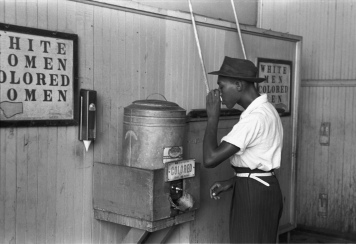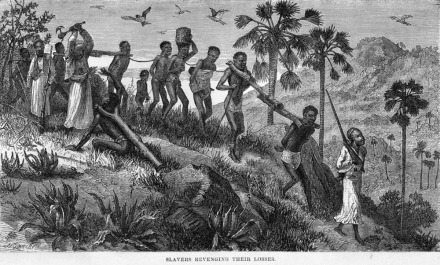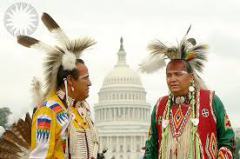I Am Sorry for the Racism
I never thought that it would be 2016, and I would be writing about the clear and evident racism in America. I never thought we would still be discussing the inequality in the job market, or clear inequality of the education system and those children of color who are more likely to go through a system that does not foster their growth to learn. I never

Segregation in the US
thought we would be discussing the issue of police violence, and apparently poor judgment as to how they can better handle these issues.
Yet, here we are, discussing the issue of race. I have found that with any issue; there is rarely a black and white answer. We can say that police officers need to be better trained. And you would be right in saying that. We can say that our government needs to spend more money on educating our children of color, and you would be right. Children of color are also less likely to go to college and more likely to be placed on the well-fare system. All of these can be solved with a better education and more job opportunities. The problem with these solutions is that they are more complicated, and require politicians to make a sensible decision on increasing the minimum wage, placing more funds in disadvantaged schools, and funding programs that help children go to college.
Racism isn’t just about these fundamental changes in a system. It is an essential change in our way of thinking. It is changing in the way that we behave and treat each other.
A friend posted a video on Facebook, with an African American woman who was talking about racism. About two minutes into the video, she stated that racism exists because white people are scared of blacks. When a white person sees a black person, he holds his wallet a little tighter. I thought about that for days, contemplating, am I scared of a black person walking in the mall. I started to go to the memory bank and picture all the times when I clinched my wallet tighter when someone passed me. I came to a new revolution that I am not scared of black people, but I am scared of the preconceived notion that has been inadvertently placed in my mind from movies and television shows. I found that I clinched my wallet just as many times for a white person, that didn’t fit the norms of what media tells us a respectable person should look like. A white person with long hair, tattoos, a frown on his face, maybe slightly sagging his jeans, smoking a cigarette, can be scary and possibly force you to clinch your wallet. Now make that same description, yet a black man. It is no different; each can be scary. Each person, when known, can be friendly, kind and willing to do anything for you. I have known many people who may be scary when seen in the mall, yet would never harm you.

Protesters stand together
If you saw a black man or a white man walking in a suit, you would be less inclined to clinch your wallet. That person also might be the same person that steals your wallet. You can never know, nor predict the good vs. the bad people. I guess my point is that racism often exists because we are naïve, and not willing to look past the skin of someone because we have been told over the years that poverty is often associated with people of color. Yet the poorest county in the US, with 98% of people living on well-fare is predominantly a white community. We don’t see this in the movies or on TV. We see young black people living in poor conditions. We see starving black children on TV. We see schools crumbling before our eyes in diverse neighborhoods. Why do we see that? I am not sure, but maybe it is because it has been the norm for centuries. The norm needs to change; the conversation needs to change.
We need to get passed the pitting us vs. them. This cop beat a black person. Therefore, the cop is racist. We need to get past the #blacklivesmatter and move to real solutions. We need to have a more intellectual conversation about racism. The questions that need to be answered, discussed and solved, is why was the young black man put into the situation, where a police officer bullied, shot or killed the young man. Did the education system fail this child? Why was the police officer racists? What led him to that point? How could the system have been different? Anyone and the media does an excellent job of this, that says the cop is entirely at fault for his racist behavior, isn’t looking at racism from an objective view. You can easily say that police offers see far more black criminals than white, and, therefore, develop a racist perception of an entire population. I am not saying this is right, but I firmly believe that for us to truly understand racism, from both sides, we must fully understand why it became an issue.
The greatest example I can come up with was Nelson Mandela. Mr. Mandela fought his entire life against the white person. He was even on a terrorist list and went to jail for his beliefs. These are stories that are shared knowledge. What we often never hear is that Mr. Mandela, while in prison, realized that if he wanted to get people on his side, he must first understand people. He learned the white man’s language; he learned their beliefs; he spoke with them and knew the deep-rooted history of why they entered into racists views. It was because of this, that when he took back his country, he did the most profound thing he could have done, he forgave them. He didn’t forget the years of oppression, the beatings, and the segregation. The past was deeply ingrained into the future, but forgiving people was the greatest tool towards solving racism. Is there still racism is South Africa, yes, but more people have friends who are different colors, people go to coffee shops and hang out at malls with people who are not the same, and they are making considerable ground towards understanding and coming to grips with racism.
The history of the US should not be forgotten. It is who we are. It is what we look towards when we say never again. However, and this may be the hardest thing for many to do, we need to forgive and say I am sorry. Asian people need to forgive white people for segregating them in camps during WW2. Black people need to forgive white people for the hundreds of years of segregation from slavery to the civil rights movement, Native American’s need to forgive the white man for stealing their land. And, white people need to acknowledge it and say I am sorry.
Could it be that simple? Could it be as simple as a grade school solution to solving a fight? No! This is too complicated, but we will get nowhere on the intellectual conversation unless we first acknowledge the situation and are willing to discuss this issue. Saying I
forgive you is not a sign of weakness, nor is it saying that you have forgotten the past. It is a sign that you are willing to stand in a united front against an issue that is starting to define our generation. Saying I am sorry, is not putting you is the same category of your ancestor, or saying that you participated in the segregation or that you are a racist. Saying I am sorry opens up the conversation. Until that conversation happens, we will run in circles and get know where.

Native Americans standing in front of the capital.
So, here I go. I am sorry! I am sorry for my ancestors coming to the US, killing millions of Native Americans and stealing their land. I am sorry for them taking black people from Africa, boarding them on slave ships and shipping them to the US like cargo. I am sorry for every slash of the whip, every tear caused, every punch and slap. I am sorry for making you drink from a different fountain. I am sorry for making you use a separate toilet or sit on the back of the bus. I am sorry for making you go to a different school. I am sorry for police turning hoses on your children or shooting them in the streets. I am sorry for everything. Please believe me, that more people are willing to stand up against racism than participates in it. I think people are confused as to how to handle it. A simple sorry might be the easiest and simplest way to start.
I would love to hear you thoughts, to start that conversation. Let’s make 2016 the year that the conversation truly begins.
Please comment and share.





